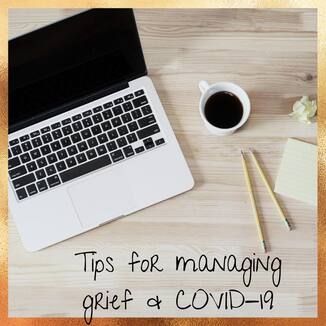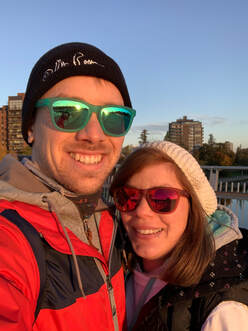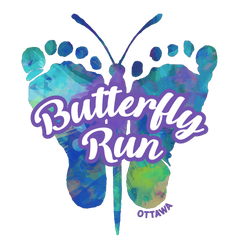|
By: Leah Day  A global pandemic is probably not what anyone had in mind when they were envisioning 2020. For those in the loss community, the COVID-19 pandemic can be particularly difficult to navigate. Physical distancing and self isolation can trigger feelings that we experienced after our loss. Often, the strategies we put in place to help with our loss are now not available to us. For example: visiting friends or family, seeing our social worker or councillor in person, being able to attend group bereavement meetings, even just the simple things like sitting in a coffee shop are now things we can not do. But, what are some things that we can do to help make this a little easier? During this time, you might need to talk to your social worker or therapist more often than before, and that is pretty understandable. Before the pandemic, I was seeing my social worker once a month and that was exactly what I needed. But when I was pushed into self isolation, I started talking to her once a week. I was then able to go down to once every two weeks. And now I reach out as I need it. This is perfectly okay, our lives have changed and needing help to navigate that change is normal. Physical exercise! I know everyone says this, and I use to roll my eyes too. When I started seeing a social worker after the loss of my daughter, exercise was suggested to me as an outlet for some of the strong feelings I was having. And it helped. So in March when things began to shut down and I suddenly found myself working from home, I started going on daily walks. It varies daily, but I try and get 30 minutes of exercise most days. I’ll be honest, I don’t want to go for a walk everyday. There were some chilly days in April and May, but most days after my walk I feel a little better. Find a sleep routine that works for you. I know for me, when I struggle with sleep, I often start struggling with my grief. But there are some things that can help. A warm bath, lavender spray, reading, light stretching, yoga and meditation are all great options that can help you fall asleep and have a better sleep. Also: maintaining a consistent bedtime. In the first few weeks of being home all day, I allowed my sleep and wake times to be all over the place, and that did not help. Having a consistent sleep routine has really helped and cut down on the number of nights I just lie in bed staring at the ceiling. Many people find it very helpful to have a place to write their thoughts down, an outlet that allows them to write down all the thoughts they may not want to share with the world. Journaling hasn’t been something that I have been able to get into but I have heard that having a place to write down those thoughts that you can’t seem to let go of can be very therapeutic. It is often suggested as part of a bedtime routine, or when you are trying to sleep but you are having repetitive thoughts, journaling maybe a helpful outlet. Meditation is another practice that I have not had great success with, but I do live with someone who practices daily meditation. My husband meditates every day. It is for sure a skill that takes work but can have real benefits especially when dealing with stressful or high anxiety situations. There are many apps that you can download on your phone or videos that you can watch online that guide you through daily meditations. As an extrovert, I have heavily relied on phone and video calls throughout the pandemic. I am also a bit of a planner so I like to set up “talking dates” with my friends so that I know when I am going to get to talk to them. Video calls especially give me a small sense of normalcy. Being able to see them really makes a difference. I like having more than one person I can talk to about my stress and anxiety so that I never feel like I’m overloading one person with all my problems. I also find it very helpful to get different people’s perspectives. When I started writing this post I reached out to friends in my loss community about what they have been doing that has helped them. A suggestion that I love was to have a project (whether it be work or home). Staying busy can be a great way to channel some of that energy and having some distraction can give your mind a break. We all have that drawer or closet that has gotten out of control, maybe now is the time to organize it. Or that garden that you only half maintain. (Wait is that just me?) Hope these suggestions help you manage this difficult time. Stay safe!
1 Comment
 Mike and Leah at the 2019 Run Mike and Leah at the 2019 Run By Mike Wheeler, a sad dad Finally! The perspective of a straight, cis, white male! Just kidding. This is not a men’s rights post, don’t worry. But it does feel strange for me to be sharing the point of view of a somewhat under-represented group of people: loss dads! I’m lucky to be married to Leah, who you may know as the person who currently runs the Ottawa Butterfly Run social media accounts and who has also contributed to this blog. Last year, after many years of very exciting medical stuff, Leah became pregnant with our daughter Eliza. On August 15th, Eliza was stillborn at 29 weeks. As far as we know, her death was due to a cord accident. In the days and weeks after Eliza was born, we received a tremendous amount of support both from The Ottawa Hospital and Roger Neilson House where we began to see our amazing social worker and attend group grief counselling. We were already incredibly lucky to have a strong support network from friends and family, but the we found that nobody really knows how to handle folks who have just lost a baby. We didn’t know how to handle ourselves. We’ll be forever grateful to the professionals at Roger Neilson House who have showed us tremendous guidance and support through our grief. While we were still in the hospital, we learned about The Butterfly Run. I love to run, and Leah comes from a big running family (she is more of a walker herself) and it seemed like something toward which we could direct a little of our energy and do something productive while we were totally lost in our grief. The event was great, and we were able to raise a little money to give back to the folks who were able to hold us up when we were at our lowest. Leah immediately decided she wanted to get involved in the next year’s run and volunteered to help out. And I wrote this blog post! Being a dad is hard, but so is writing about being a dad. I keep writing, deleting, and re-writing this paragraph. I’ve been struggling to talk about my experience as a dad because I keep feeling like anything I say about it is going to come across as being in opposition to the experience of being a mom. Or even worse, I’m worried about minimizing the experience of others. When I start writing about how dads get sad too, my inner-critic chimes in and says “are you saying that you’re more sad than moms or just that you deserve more attention than you’re getting?” And obviously, this is not the attitude with which I want to portray sad dads. I voiced these concerns to a wiser and much much much older dad, and he helped me realize that this is actually the perspective that I should be sharing. So at the risk of sounding like a big whiny complainer, let’s fire up the BBQ, put on our favourite novelty apron, and get ready for my fatherly insecurities! Sad dads and bummed mums. Leah and I make an excellent team. She knows the depths of my grief and I know hers and that works out great. In the early days after coming home without Eliza, we found that we would tag-team feeling destroyed. It was incredibly fortunate that one of was usually okay enough to support the other. I mention all of this because I have always felt like we’re deep in this together and we’re sharing one grief journey and the experience of becoming Eliza’s parents. Our paths aren’t always the same and our highs and lows can differ, but we’re a single parenting unit. But we don’t always get treated that way. While in the hospital, Leah was offered appointments and consultations with the psychiatric unit to make sure her brain was in good working order. I didn’t receive the same offer. When we left the hospital, Leah began her 16 weeks of maternity leave. I got five bereavement days from my employer for the death of my child. (Don’t worry, I got my doctor to write me off on stress leave so that I could take care of Leah while she recovered from her c-section.) I love to talk about our experience and to tell people about Eliza, and the first question out of everyone’s mouth when the hear about what happened is “how is your wife?” It’s an important question, and one that I am also very concerned about, but pretty frequently, the follow-up question, “how are you doing” never arrives. Moms and dads: the same but different? I think that this all comes from two places:
I hope that didn’t all come across as too whiny or dramatic. As much as Leah and I are an elite parenting team, there’s no point in pretending that we’ve had the exact same experience. The first example that comes to mind is that I got to talk to Eliza and feel her moving around, but she wasn’t - you know - inside of my body. How this should impact people’s concern for our well-being, I’m honestly not sure. I don’t have a fix for any of this, but I am going to be out here talking about this stuff, so maybe that will be a small nudge in the right direction. Along with his partner, Leah, Mike hosts a podcast called Baby Quest that is about exactly this kind of stuff. He can also be found on Twitter @TheMikeWheeler, even though it’s not good for his mental health to be on there.
|
Archives
April 2023
Categories
All
|

 RSS Feed
RSS Feed